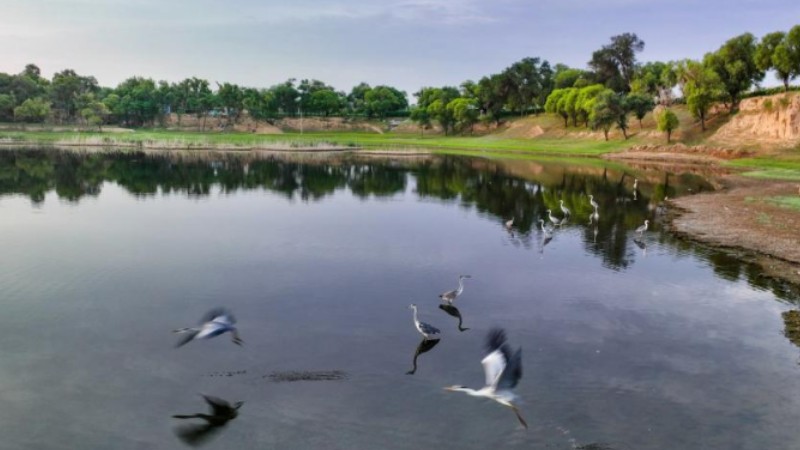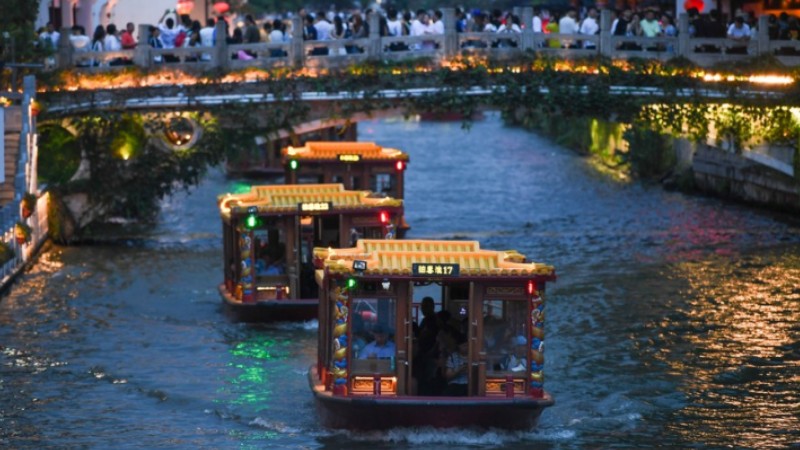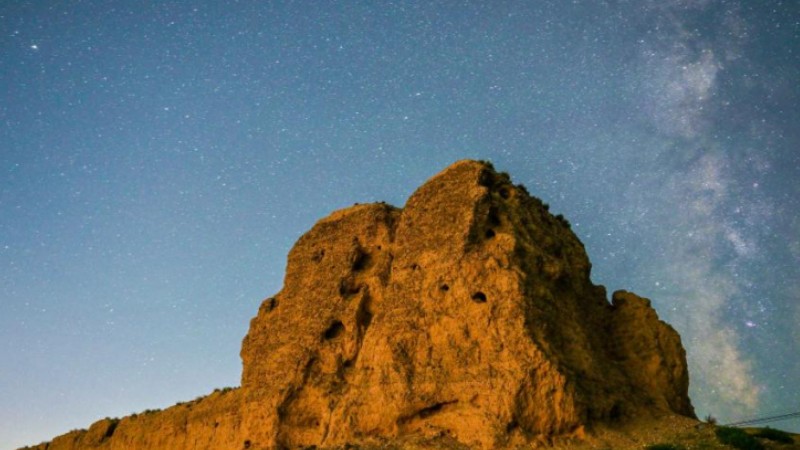China suspends all aquatic products from Japan over Fukushima contaminated water dumping
China has with immediate effect banned import of all aquatic products originating from Japan starting from Thursday, when Japan started dumping nuclear-contaminated wastewater from crippled Fukushima Daiichi nuclear power plant into the sea - a move by the Asia island nation that will be "nailed to history's mast of shame," decried stakeholders and the wider public at home and abroad.
On Thursday 1 pm local time, the start of the dumping of around 540 Olympic swimming pools' worth of water over several decades marked a big step for Japan in decommissioning the still highly dangerous site 12 years after one of the world's worst nuclear accidents in Fukushima Prefecture, according to media reports.
Although the move of dumping is a fait-accompli and the majority of the Western world remain silent, fishermen, environmental activists and the wider public in Japan and the world at large vowed to fight till the end and some have even asked Japanese Prime Minister Fumio Kishida to step down.
China strongly condemned the Japanese government's commencement of dumping nuclear-contaminated wastewater, as the Chinese Foreign Ministry made serious démarches to Japan and urged it to stop the wrongdoing.
"The Chinese government has always put people first, and will take all necessary measures to maintain and protect food security and the public health," Chinese Foreign Ministry spokesperson Wang Wenbin said at a regular press briefing on Thursday.
Given that Tokyo has used July's IAEA report, which has lost its credibility, as a shield, China Atomic Energy Authority (CAEA) told the press on Thursday the move by the Japanese government seriously undermined the authority and credibility of the International Atomic Energy Agency (IAEA), the health of the people of neighboring countries and the rights and interests of the marine environment, and the safety and development interests of the global nuclear energy industry.
In order to prevent nuclear-contaminated Japanese food from entering the country and protect the health of Chinese people, China's General Administration of Customs (GAC) said Thursday it has carried out continuous evaluation of risk over radioactive contamination of Japanese food and has tightened supervision measures on food imported from Japan to strictly ensure food security.
In another follow-up measure, the National Nuclear Safety Administration of China's Ministry of Ecology and Environment (MEE) on Thursday announced that relevant departments are organizing the marine radiation environment monitoring of China's jurisdictional sea areas in 2023.
Also the Ministry of Agriculture and Rural Affairs will step up monitoring of nuclear pollution risks of aquatic products.
The MEE said China organized and carried out marine radiation environment monitoring in the sea areas under its jurisdiction in 2021 and 2022. The monitoring results showed that the concentration of artificial radionuclide activity in seawater and marine organisms in the jurisdiction area of China was normal.
The direction of ocean current and the concentration of discharge affect the conclusion of "how much influence the release of nuclear-contaminated water has on China," Ma Jun, director of the Beijing-based Institute of Public and Environmental Affairs, told the Global Times. Ma stressed that China should further strengthen its nuclear radiation early warning and monitoring network laid out in many cities. He also called for establishing distant-water monitoring stations.
Zhao Shunping, deputy director and researcher of the Radiation Environment Monitoring Technology Center, the Ministry of Ecology and Environment, stressed the significance of monitoring of radioactivity concentrations in seawater, sediment and marine life via the monitoring stations deployed in the waters under China's jurisdiction and detection for key ocean current channels.
Zhao told the Global Times that China could also conduct ballast water detection. For example, some ships go within the vicinity of Fukushima discharge outlet, and when they return, we can collect and detect the water samples.

If Fukushima's nuclear-contaminated water is safe, why doesn't Japan use it on its own land first? Graphic:GT
Reaction worldwide
In another Japan's neighbor - South Korea, fierce domestic political wrangling has erupted over its own government's endorsement of the Japanese move. Liberal critics have accused the conservative government led by President Yoon Suk-yeol of pushing to improve ties with Japan at the sacrifice of public health.
"The Yoon Suk-yeol government and the ruling People Power Party are accomplices in the dumping of the wastewater," said Kwon Chil-seung, a spokesperson for the main opposition Democratic Party, according to an AP report on Thursday.
"I oppose Japan's discharge of the radioactive water," former South Korean president Moon Jae-in tweeted, noting the Korean government's response to Japan's move is wrong.
But the South Korean governing party accused the opposition of inciting anti-Japan sentiment and public fears for political gain, undermining national interests and driving those in the domestic fisheries and seafood industries to the edge, the AP report revealed.
On the same day, South Korean police detained 16 student activists for allegedly trying to enter the Japanese Embassy illegally to protest the contaminated water dumping.
However, Pacific island nations are divided over Fukushima wastewater dumping.
Reuters reported Wednesday that Cook Islands Prime Minister Mark Brown, chairman of the Pacific Islands Forum, said that although the UN nuclear watchdog "greenlighted" the Japan's plan in July, the region may not agree on the "complex" issue.
Additionally, the US has apparently indulged Japan over the plan. Last week, before the US President Joe Biden hosted Japanese Prime Minister Fumio Kishida and South Korean President Yoon at Camp David, Secretary of State Antony Blinken said that the US was satisfied with Japan's plan.
Other US allies, who have always boasted about their efforts in protecting the global environment and human rights, have been silent over the historical dumping of nuclear-contaminated wastewater with none of the key Western figures making public comments over the issue recently.
Chinese observers said Washington's indulgence on Tokyo's move is a "political deal" in exchange for Japan's closer strategic adherence, which once again reflects the US' and US-led camp's double standards and hypocrisy.
Non-stop fight
Using big data analysis, a research center of the Belt and Road Research Institute, Hainan University found that only 7 percent of the international community supported the Japanese government's move. Even a significant number of the Japanese people are seriously opposed to the actions. The US public is also at odds with its government, with only a tiny proportion (2 percent) in favor.
Residents of Fukushima, Miyagi and Ibaraki prefectures, including fishing workers, will file a lawsuit with the Fukushima court on September 8 against the Japanese government and the Tokyo Electric Power Company (TEPCO) to stop the dumping process, Chiyo Oda, co-chairperson of an environmental NGO and citizens' assembly "Stop polluting the oceans!" told the Global Times on Thursday.
"I hope that the trial will stop it [the dumping process] as soon as possible. I will continue to do what I can and raise my voice. We are by no means satisfied with this dumping," said Oda, who lives in Iwaki, Fukushima Prefecture. "We will continue to fight [against the dumping]."
Protests and rallies have been held across Japan, including Tokyo and Fukushima before and after Kishida decided to start the dumping, Oda revealed.
"The government made the decision without listening to our voices, which was very reckless," Oda decried.
Another Fukushima local, Yoshitaka Ikarashi, also a representative of an NGO on rethinking of Fukushima nuclear incident, along with a Japanese lawyer and a former lawmaker Hideki Ito, submitted a proposal to a cross-partisan political organization including Japanese ruling Liberal Democratic Party and other parties' politicians to raise concerns over the contaminated water dumping. Ikarashi also called for the change of the regime.
In China's Hong Kong Special Administrative Region, dozens of protesters rallied along the streets shouting "Global enemy!" on Thursday in front of the Consulate-General of Japan in Hong Kong, calling on Kishida to step down as the Japanese head ignored the outrage of the international community over the dumping plan.
This reminded Global Times reporters of an irony. When Kishida boasted that he is "good at listening" during the leadership election for the LDP in September 2021, he held a blue notebook with a tattered cover, saying "I have written 30 such notebooks over the past 10 years after listening to the public."
When the Global Times reporters walked through Tokyo after a visit to Fukushima in May, a new political campaign poster of Kishida came into view. It read, "With local voices, to create a new Japan." But this doesn't seem to have anything to do with the current situation in Fukushima.
Photos
Related Stories
- Interview: Japan's nuclear wastewater dumping threatens human health, global ecosystem: Pakistani expert
- Interview: Japan's nuclear-contaminated wastewater dumping unilateral, irresponsible, says Pakistani expert
- DPRK condemns Japan's discharge of nuclear-contaminated wastewater into sea
- Moscow expects all necessary information on Fukushima nuke wastewater release
- S. Korean opposition lawmakers protest against Japan's nuke wastewater discharge
- Commentary: Japan's nuclear-contaminated water discharge selfish, irresponsible
- China's atomic energy authority condemns Japan's release of nuclear-contaminated water
- Japan threatens planet with radioactive water
- All aquatic imports from Japan suspended
- Japan starts releasing Fukushima nuclear-contaminated water into ocean amid opposition
Copyright © 2023 People's Daily Online. All Rights Reserved.









